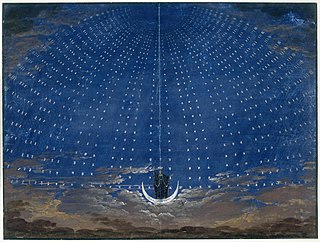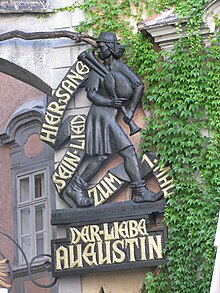
The Great Plague of Vienna occurred in 1679 in Vienna, Austria, the imperial residence of the Austrian Habsburg rulers. From contemporary descriptions, the disease is believed to have been bubonic plague, which is caused by the bacterium Yersinia pestis, carried by fleas associated with the black rat and other rodents. The city was crippled by the epidemic, which recurred fitfully into the early 1680s, claiming an estimated 76,000 residents.

"O du lieber Augustin" is a popular Viennese song, first published about 1800. It is said to refer to the balladeer Marx Augustin and his brush with death in 1679. Augustin himself is sometimes named as the author, but the origin is unclear.

Peter Alexander Ferdinand Maximilian Neumayer, commonly known as Peter Alexander, was an Austrian actor, singer and one of the most popular entertainers in the German-language world between the 1950s and his retirement. His fame emerged in the 1950s and 1960s through popular film comedies and successful recordings, predominantly of Schlager and operetta repertory. Later, Alexander established himself as the acclaimed host of television shows. His career as a live singer touring the German language countries lasted until 1991, while he continued his television work until 1996.

"Polly Put the Kettle On" is an English nursery rhyme. It has a Roud Folk Song Index number of 7899.

"Under the Anheuser Bush" is a beer garden song commissioned by the Anheuser-Busch brewing company in 1903. With music by Harry Von Tilzer and words by Andrew B. Sterling, the title contains a pun on the surnames of the company's founders.
Otto Edelmann was an Austrian operatic bass.
The Concerto in C minor for Piano, Trumpet, and String Orchestra, Op. 35, was completed by Dmitri Shostakovich in 1933.

"O zittre nicht, mein lieber Sohn" is the first aria performed by the Queen of the Night in Mozart's singspiel The Magic Flute . It is not as well known as the Queen's second aria, "Der Hölle Rache kocht in meinem Herzen", though no less demanding; the aria requires a soprano coloratura with extremely high tessitura and great vocal flexibility.

Wilma Lipp was an Austrian operatic soprano and academic voice teacher. A long-time member of the Vienna State Opera, she was particularly associated with the role of the Queen of the Night in Mozart's Die Zauberflöte, a role she performed internationally more than 400 times. She was awarded the title Kammersängerin at age 28, and was an honorary member of the Vienna State Opera, among other honours.

Jan Kleczyński was a Polish pianist, composer, journalist, and chess master.
Augustin Pfleger was a German Bohemian composer.

Johann Sebastian Bach composed the church cantata Ich glaube, lieber Herr, hilf meinem Unglauben, BWV 109, in Leipzig for the 21st Sunday after Trinity and first performed it on 17 October 1723.

Schau, lieber Gott, wie meine Feind, BWV 153, is a church cantata by Johann Sebastian Bach. He composed it in Leipzig for the Sunday after New Year's Day and first performed it on 2 January 1724.
Singing To the Bus Driver or Hail To the Bus Driver is an anonymous United States folk song dating to the mid-20th century. It is a popular children's song, particularly among pre-teens, and is often sung by children on school bus trips to keep themselves amused. It is sung to the tune of the traditional children's songs The More We Get Together and Did You Ever See A Lassie?, which in turn are derived from a 1679 Viennese tune by Marx Augustin, Oh du lieber Augustin.
"The More We Get Together", now regarded today as a popular English-language children's song, of American origin, was originally written by Irving King as the anthem of the Ancient Order of Froth Blowers, to be sung to an old Viennese tune, "O du lieber Augustin". Sheet music of the drinking song and a gramophone recording were issued during the 1920s. Later it featured as a cowboy song in the Columbia Pictures movie series, this time as "The More We Get Together", in Challenge of the Range (1949) and in The Rough, Tough West (1952).
Franz Karl Hofmann, later Charles Hofmann was a Dutch musician and composer.
Beloved Augustin may refer to:
Oh, Dear Augustine is a 1922 Austrian silent film directed by Hans Karl Breslauer and starring Willi Forst. It takes its title from the popular Viennese song "Oh du lieber Augustin".

Friedrich Dörr was a German Catholic priest and professor of theology, who is known as a hymnwriter. He shaped the first common German Catholic hymnal, Gotteslob, published in 1975.











